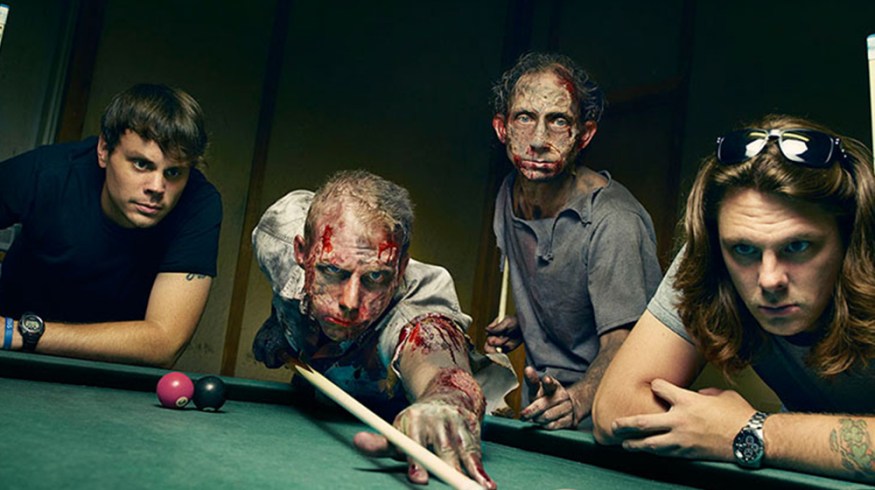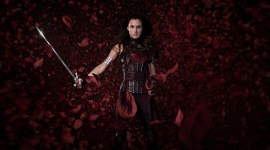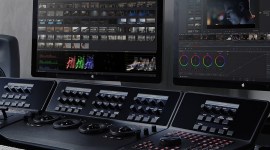
Reality Television Editors Sound Off on the Craft
Some of the best reality television editors sat to chat on a panel at this year’s Sight, Sound and Story in NYC. Here are a few highlights of the talk.
Reality TV editors Alanna Yudin (Ink Master, Mob Wives), Joe Schuck (Alaskan Bush People, Best Funeral Ever), and Julie “Bob” Lombardi (Teen Mom, Town of the Living Dead) spoke with Gordon Burkell of AOTG.com as part of Sight, Sound and Story’s annual New York City event presented by Manhattan Edit Workshop on June 13th. Here’s some of what they talked about. 
Image from Ink Master
Gordon: How do you handle the amount of footage that comes in?
Julie: I always watch the raw footage. I make the time. I like the producers kind of telling me what the scene is about, but then you just dive in and watch it all. If you’re on season three it’s a lot easier to know what you’re looking for.
Alanna: Yeah, I’m the same way. I’ll use the producer’s selects just as a guideline, but then go back and find what you need.
Julie: Editors are used to manipulating footage. Some producers don’t know how to watch footage and how you can manipulate it, so they cut something because they think it doesn’t work. Or they might not give you a great piece of audio because it’s off camera and they don’t know you can cheat it. But you have to look at all of the footage. That way you have all the pieces to the puzzle to make the best picture.
Alanna: Ultimately it does end up saving time. If three hours have been shot for a two-minute scene, well, I have three hours.
Julie: And when you have notes you already have the answers.
Alanna: I think the difference in the way producers or people who don’t edit look at the footage is as one ongoing scene with no cuts. But as an editor we watch every second and every frame, every piece of audio, as its own entity.
Julie: You’re looking for glances, looks, smirks, any piece to make the story more believable or more dramatic. So if the camera catches somebody giving the stink-eye to the producer or the audio guy or whatever, you can always use that to manipulate the edit, which is so important.

Image from Mob Wives
Gordon: Can you comment on working with story producers?
Julie: A good story producer is heaven-sent. Sometimes it takes so long to get the story that the edit suffers because you’re trying to figure out what you’re saying. In those cases you don’t have a lot of time to make the edit the most beautiful or funniest. But if you have a good story producer that already has the story arc for you, and you can really focus on the edit, that’s great.
Alanna: A really good story editor will also help you find those pieces. It’s really a pleasure to work with someone like that because they’re effectively your team mate.
Joe: That’s a good point. It’s a collaborative effort, where sometimes you just want to dig into the footage yourself, but it’s great to have someone there to bounce ideas off with. If you’re not super confident about your edit it’s good to get fresh eyes from them. Some story producers are thinking about the A, B, and C moments of the episode, others are thinking of those moments in the series. There are a lot of hands helping out for this to work effectively.
Julie: I try to do all the ideas if I have time, even if I don’t think they’ll work I try to make it the best I can, just in case. There are times I’m wrong! You cut something and it totally works. I love collaborating with different editors. I always drag people into my edit to ask them to watch and see if it works, and I love going into other people’s edits and looking at stuff. You don’t make TV or films by yourself.

Image from Teen Mom
Joe: If you’re working on something for eight weeks, the footage stops getting funny real quick when you’re working those late nights. What made you laugh the first time you were watching the raw four or five weeks ago no longer gets even a smirk. Another editor or story producer, they’re your first audience. And they’re in the business so they’re looking for technical things as well.
Alanna: When you work in a very formatted show you have very set limits, but there’s a lot of freedom within those limits. You may only have a minute to make this point, to get in and out, but there’s still a lot of freedom within that. On something like Teen Mom, there may be so much freedom you drive yourself crazy, there are so many ways you could go.
Julie: Yeah, on shows like that it’s more of a flow, and everything has to lead into one another. In competition shows sometimes you can just have an explosion of crazy and not really have to explain it too much.
Alanna: Those are two totally different series. Teen Mom is more about the emotional arc within the scene, with not a lot of music or montage.

Image from Town of the Living Dead
Gordon: Yeah, you don’t have the ability to rely on talking heads. When you start something like Ink Master, they have like 16 contestants. How do you cut that show so that everyone sort of has their moment?
Alanna: It’s just a barrage of craziness for the first couple of episodes when you’re trying to introduce everyone and make clear who’s talking in each scene. You’re right, it is very different on episode one or two. The number of cameras varies depending on the scene. When they’re getting critiqued at the judge’s table, it could be seven or eight cameras. When they shoot the verité stuff it’s like three cameras. They split up the crew with different groups of competitors, most likely talking about the other group. The way Ink Master works is that each editor takes a different challenge. So there’s a “Flash Challenge” editor, there’s an editor who just cuts the elimination, and so on. My job on the show is to do all the “house reality,” they call it. So it’s all the verité scenes between the characters that happen between the challenges. That’s my strength. When I first got on the show I did cut some of the other stuff but the producers realized my strength was with the verité stuff, so that was a good fit. I just started on my fifth season of the show, and I still really enjoy it. Even though there are those limits and everything’s very formatted, it doesn’t get repetitive because the characters are different, they’re funny, there’s always different issues, there’s always a way to amp up the drama. I really love the challenge of it.
Gordon: How do you work on a show with multiple editors?
Julie: We all talk about what’s going on in everyone’s episode, or if you might have anything that they need. There’s usually an open conversation at most of the places I work.
Alanna: Sometimes I’ll find something in the raw where I think, “Oh this could be something funny to reference later,” then go talk to the editor who’s doing act five.
Joe: Yeah, you’re all on the same team, and the more eyes on the footage the better, you know?
Julie: You’re pretty much all on the same level as editors. If someone’s a junior editor, everyone knows and they help them along and show them the tricks.

Image from Alaskan Bush People
Gordon: Any specific challenges when working on reality?
Julie: A lot of the time, reality stars don’t finish sentences. I’ll put in the title of whatever words I’m looking for, just so I remember that when I hear that word somewhere, I need to steal it and finish the thought. It can be a challenge.
Gordon: Some editors I know work by assembling a “radio cut” of just the audio. Any thoughts on that?
Joe: For me I like to get my foot in the water as fast as possible. It depends on deadlines, a lot of people just want to see if the story’s working. I try to make it work right off the bat.
Julie: I have a weird process. I do a little bit of everything. If I spend too much time up front making some beautiful b-roll pass, and then the producers don’t use that scene, it’s like I just wasted so much time, so I make everything sort of halfway finished just to see if it works, and then I go in and fill it in. I can see it in my own head but I wouldn’t show a producer or someone that doesn’t know how I work that cut.
Alanna: It has to work the way it’s going to work from the beginning. In reality TV, the networks don’t want to see what used to be called a rough cut. A rough cut today is what a fine cut used to look like and it needs to look pretty close to finished. And if they throw the scene out, well, you have to change it. It’s just part of the process.

Image from Best Funeral Ever
Gordon: Where do you draw the line with ethics in the edit?
Julie: I haven’t worked on a lot of shows where they’re really doing sketchy things in the edit. I think to work as an editor on a reality show you do have to entertain the audience, so you’re constantly taking things out of context, but you’re still keeping the essence of what’s happening. You’re skewing it a little to make it funnier or more dramatic.
Alanna: There are several times I’ve said no, but it was less based on an ethical reason and more based on the fact that the suggestion made wasn’t going to help the story. One time on Wife Swap they wanted me to cut a scene where one of the wives witnesses the castration of a pig. I put my foot down and said, “Who is not going to change the channel when they hear this pig squealing?” There were other ways to tell the story of this wife being in a fish-out-of-water situation.
Joe: For me it’s what’s believable. Ethics goes a long way, but the reality is that you’re faced with constraints, budgets, and crazy deadlines and we have to make things work. We’re not going out there the next week to reshoot and hope they do it better. As far as drawing the line for me, it’s about how much you can have the audience believe while trying to keep the story and truth in there. The bottom line is we don’t have endless amounts of money. We only have 8-12 weeks to cut a show, it’s a lot of stuff to do, with three or four passes, so you really have to make those decisions quick and stand by them.
Julie: In reality television, you don’t want to watch the perfect version of yourself, right? You want to watch the funnier or more dramatic version. If we just watched our lives on TV that would be a terrible show.
Here are a few more interesting articles about editing, including a couple of additional looks at the 2015 Sight, Sound and Story gathering in NYC!
- Insights from Several Top Television Editors
- Film Editing Lessons from Oscar-Winner William Goldenberg
- Learn the Secrets of Film Editing in Seven Minutes
Got any thoughts on what the editors shared during their panel? Let us know in the comments below!





